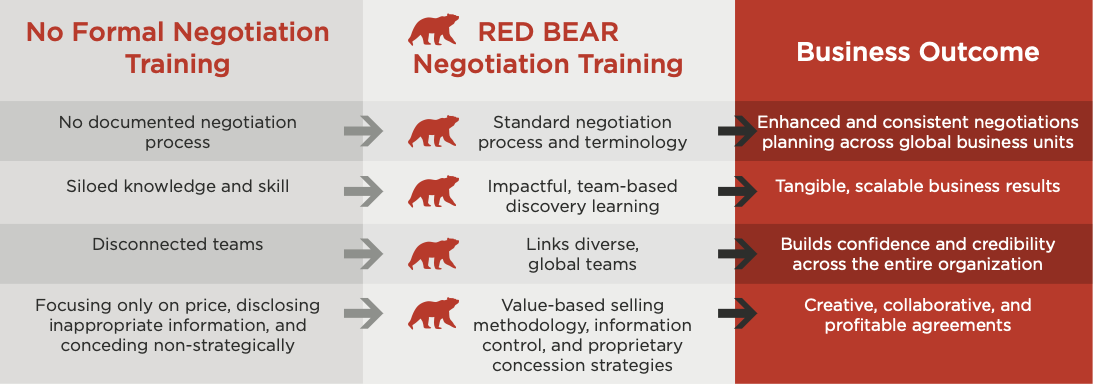Yes, you need essential negotiation skills to get your desired outcome.
But the reality is that skills alone won't help you or your team find repeatable success, especially in business negotiations.
Think about it like this: a basketball player may have all the fundamental skills to make the perfect shot, but if the game plan isn't effective, they'll never get the chance to put those skills in action.
To build an effective "game plan" or negotiation strategy for your team, you need to start with the negotiation planning process.
Without standard practices, your team will start every negotiation session from scratch without the institutional knowledge, skills, processes, and information needed to stay on track and reach consistent, profitable, and scalable outcomes.
Let's explore what a negotiation process is—and how it will help your team drill their "shots" every time.
Why Effective Negotiation Planning Matters
Here's the thing: with the right negotiation training and framework, anyone on your team can run a successful negotiation.
Yes, anyone—from your new hire to your seasoned vet.
To do that, your organization must establish the processes and standards required for consistent success.
Without a solid negotiation foundation, you’ll miss a strategy that:
- Builds on real, relevant experience: Instead, you’re left relying on outdated training or scattered past experiences that don’t match today’s challenges.
Example: You fall back on what worked in a previous job, but it doesn’t address your current client’s priorities or your team’s goals.
- Aligns with your organization’s unique needs: You risk pushing generic tactics that ignore your company's specific objectives and constraints.
Example: You only negotiate for price cuts when your business actually needs longer payment terms or added services.
- Captures all critical deal information: Key possible agreement details—like must-haves, nice-to-haves, and best alternatives—fall through the cracks.
Example: You focus solely on headline numbers and miss out on negotiating for flexible delivery schedules or support packages.
- Reflects the right negotiation behaviors: You default to habits that might be counterproductive, like conceding too early or holding firm when flexibility would win more.
Example: You give in quickly to avoid conflict, sacrificing the value your company needs.
- Connects with your stakeholders’ demands: You overlook internal alignment, so your negotiated agreements don’t stick or get the buy-in you need.
Example: You close a deal that looks good on paper but fails because operations or legal weren’t looped in.
Bottom line: Without a tailored approach, you’re flying blind—missing opportunities, leaving value on the table, and risking deals that don’t deliver for your business.
In addition to ensuring your team is better prepared, a well-structured negotiation process allows you to better anticipate (and prepare for) the other party's strategy.
In short, planning improves negotiation power.
“Planning improves negotiation power.”
The Two Stages of Good Negotiation Planning
Contrary to what you might think, negotiations begin far before the bargaining table.
At RED BEAR, we break negotiation planning into two phases:
- Research
- Anticipation
Whether it's cross-cultural, sales, or procurement negotiations, good negotiators build effective strategies by planning and using these two distinct phases.
PHASE 1: RESEARCH
The research phase is all about objective preparation.
This isn’t just about pulling last year’s numbers or skimming a supplier’s website. It’s about getting objective, actionable intel.
For example, if you’re negotiating with a supplier whose initial position is pushing for higher prices, don’t stop at face value.
Dig deeper: Maybe they’re worried about unpredictable order cancellations, so the price hike is really about risk, not greed. If you uncover this, you can offer a volume commitment or a longer contract instead of just haggling over price—suddenly, you’ve created a deal that works for both sides.
Research means running the numbers, mapping out your must-haves, and getting sign-off from your internal team. It’s about knowing your own objectives and where you can flex, as well as understanding the other party’s business pressures and what really drives their demands. Maybe your company’s biggest lever is volume, or maybe it’s your ability to pay faster—either way, you need to know before you sit down.
Good research also means developing options and fallback plans. If your ideal terms aren’t possible, what’s your Plan B or C? And don’t forget to get approvals from stakeholders early, so you’re not scrambling mid-negotiation.
Bottom line: research sets the ground rules for the negotiation. It's about arming yourself with facts, context, and internal alignment, so you can negotiate from a position of strength and avoid costly surprises at the table, especially at the bargaining stage.
PHASE 2: ANTICIPATION
Next is the anticipation phase. This phase is all about subjective preparation. Experienced negotiators will spend time picturing themselves in the other party's shoes.
- What kind of pressure are they under?
- What do their demands look like?
- What are some difficult questions they might ask?
High-performing negotiators ask these questions and many more to build a firm understanding of the other side.
In this phase, it's a good idea to pull from your previous negotiation experience with similar companies, industries, and organizations.
Lean on your good habits of active listening, asking good questions, leaning into tension, and working collaboratively to find a mutually beneficial solution. Doing so will help you anticipate with greater purpose and accuracy.
Bonus: Building Your Concessions Plan
Within these two phases, you'll start to form something super important for any negotiation—concessions.
Forget the old-school idea that concessions are just about giving ground. In reality, a strong concessions plan is a core part of negotiation preparation—it’s how you keep control of the process, protect value, and build real trust.
Start by mapping out your priorities and non-negotiables, but don’t stop there. List out every possible negotiable, including creative options that cost you little but might mean a lot to the other side—think flexible delivery dates, extended warranties, or bundled services. This is where you find those “elegant negotiables” that can unlock a deal without eroding your margins.
Anticipate the other party's counterarguments and what tactics they might use. If you know a client always asks for price cuts, plan your response in advance—maybe you trade a small discount for a longer contract or a bigger order. The goal is to never give something away for nothing. Every concession should be tied to a clear ask in return, reinforcing the principle of reciprocity.
Effective negotiators also avoid the trap of conceding too much, too fast. Instead, they start small, move slowly, and make each concession count—showing the other side that every give has value and isn’t automatic. Track each concession as you go, so you don’t lose sight of the big picture or repeat yourself.
Ultimately, a well-prepared concessions plan is about more than just defense. It’s a proactive tool to shape the negotiation, foster collaboration, and ensure you walk away with a result that works for your business and strengthens the relationship going forward.
Where Your Negotiation Plan Takes Flight
As we talked about before, any successful negotiation requires the right negotiation skills and process.
How do you marry the information you uncover in the planning process with the tenets of good negotiation?
With a strong negotiation template.
Built on the right principles and behaviors, a good template will review several key areas of a negotiation:
- Target terms and offers
- Positioning statement
- Customer wants
And much more.
We're happy to give this template to you—all you've got to do is ask.
In it, we'll help you craft a repeatable negotiation analysis framework and action plan to give your team the confidence they need before negotiations occur.
GET THE TOOLS YOU NEED TO RUN A SUCCESSFUL NEGOTIATION
You can't negotiate well in your professional life without a solid negotiation process.
That's because a process established standardized systems, workflows, terminology, and a theoretical framework to help your team shape each and every negotiation they're part of.
Doing so helps teams speak the same negotiation language—and that language ends in success.
Whether it's proper planning or learning the foundational principles and behaviors of effective negotiations, RED BEAR can help your team get more from every negotiation meeting.



